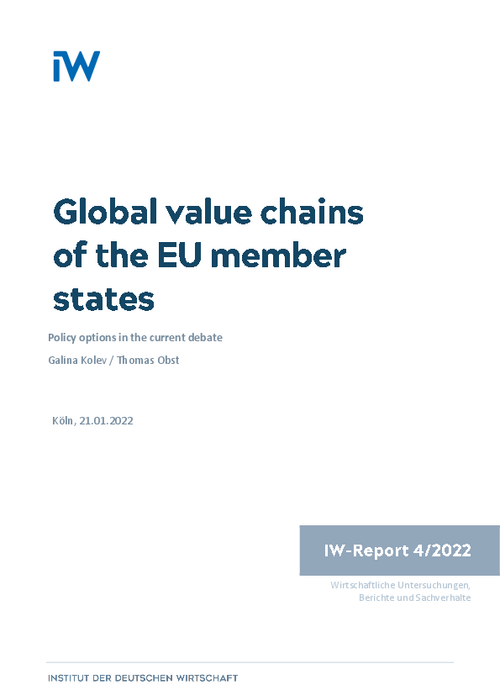In 2020, EU companies imported intermediate products worth 2.4 trillion euros, which made up more than half of total merchandise imports of the EU. Compared to the pre-crisis year 2019, imports of intermediates decreased by 13 percent, partly driven by the lower fuel prices.

Global value chains of the EU member states: Policy options in the current debate

In 2020, EU companies imported intermediate products worth 2.4 trillion euros, which made up more than half of total merchandise imports of the EU. Compared to the pre-crisis year 2019, imports of intermediates decreased by 13 percent, partly driven by the lower fuel prices.
A detailed analysis of trade in value added shows that in most EU countries more than half of the imported intermediate products come from other EU member states. Extra-EU sources of value added in domestic final demand and exports are particularly important in the smaller economies like Luxembourg and Malta, but also in the biggest EU member states Germany, France, Italy and Spain. Among the Non-EU countries, especially the USA, UK, China, and Russia contribute substantially in terms of value added to the production process of EU member states. The USA are the most important source of value added outside the EU for several countries like Ireland, the Netherlands, Belgium, Germany, France, Spain, etc. The UK is the top non-EU-provider of value added for Cyprus. China delivers the largest share of non-EU value added in some countries from Central and Eastern Europe like Slovenia, the Czech Republic and Poland. Russia is particularly important for the Baltic countries, Bulgaria and Slovakia. Among the EU member states, Germany is the most important source of value added for the domestic final demand and exports in most of the other EU countries – notable exceptions are Belgium and Ireland, where more value added comes from France than from Germany.
The corona crisis has revealed the fragility of global value chains. Industries are increasingly and asymmetrically connected with each other. Value chains were internationalized to achieve efficiency and economies of scale. Outsourcing, offshoring and lean production lines with low inventory stocks, however, have made the European economy vulnerable to disruptions and shortages of supply chains. A disruption caused by an event such as the corona crisis can propagate along supply chains affecting direct and indirect suppliers as well as customers of disaster-stricken firms. Hence, the perceived trade-off between low prices of intermediate products and the increased risk of being dependent on complex global supply chains has gained new attention in the context of the pandemic. European policymakers are thus calling for a larger role of reshoring in some industries. However, the actual size and dimensions of reshoring in Europe and Germany in the past have been limited as this is only one of many possible strategies to increase resilience of value chains. This indicates a misalignment between the perspective of companies and priorities of policy makers.
The design of the value chain network is a matter of economic decision-making and a potential structural change can only be initiated by companies in the course of reassessing the above-mentioned trade-off and of reconsidering the risks of international supply chains. Besides reshoring, other potential measures to increase resilience concern the diversification of supply chains, increasing stockkeeping, or adjusting delivery times. In terms of economic policy, state interventions are only reasonable for industries producing essentials (e.g. certain medicines or personal protective equipment). However, it is crucial that supply chains, which are already disrupted, are not further affected by additional trade conflicts. Protectionist measures covered in the strategy of restructuring supply chains motivated by the current crisis hence entail the danger of reversing the achievements in trade liberalization and specialization of the last decades.

Global value chains of the EU member states: Policy options in the current debate

Not so Different?: Dependency of the German and Italian Industry on China Intermediate Inputs
On average the German and Italian industry display a very similar intermediate input dependence on China, whether accounting for domestic inputs or not.
IW
Schwächelnde Wirtschaft: Wo steht die EU im Vergleich?
Ungefähr eine Million Industriearbeitsplätze sind laut einer Studie des Europäischen Gewerkschaftsbunds in der EU in den vergangenen vier Jahren verloren gegangen. Die EU-Staats- und Regierungschefs wollen heute auf dem EU-Gipfel besprechen, wie sie die ...
IW